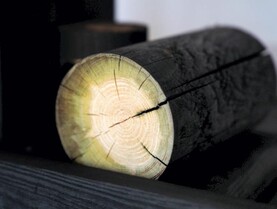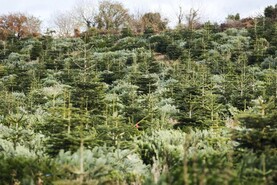The Department of Agriculture, Food and the Marine dashboard reports provide a weekly breakdown of planting, felling and roading licences issued by area and number, as well as data on native tree area (NTA), reconstitution of ash dieback (RADS) and woodland improvement (WI) schemes.
The good news is that 24km of roading licences were issued compared with 27km in January, which is the highest two-monthly total since 2019 (58km).
Felling licences were down from 2,889ha in January to 1,460ha, which is a significant drop on previous years when licences averaged 3,100ha for the first two months.
Afforestation
While 43 licences were issued for afforestation in February compared with 38 in January, the area grant-aided fell from 351ha to 316ha. This is due to a fall in average planting sizes per licence – from 9.2ha to 7.3ha.
The chink of light in the February returns was the above average licences approved for the final week which, at 20, is close to the monthly average approved since the programme was launched last September.
“For the first time, the number of afforestation licences issued in the final week of February, meets the minimum number needed to reach the annual planting target,” said a spokesperson for the Social, Economic and Environmental Forestry Association (SEEFA).
“We welcome this and encourage the Government to continue at this pace,” he added.
“However, the licences backlog continues to be an issue, and felling, which has consistently been the least poorly performing section, is now struggling to match even half of last year’s pace.”
The “monthly target for private licences with ecology input” has been removed from the dashboard.
This was introduced to show the number of all licences issued by the Department’s ecologists.
The minimum monthly target agreed between the Department and the forestry and forest products sector was 220 licences. On three occasions, this was exceeded over the 17-month period from July 2022 to November 2023.
The average number of licences issued by ecology during this period was 146.
As January to mid-May is the peak period for planting, the licences issued over these months will define the afforestation programme for 2023.
Total planting licences issued for afforestation since the current programme was launched amount to 1,276ha which, along with the 1,000ha of afforestation licence now granted from last year, should provide 4,300ha of licences for a 12-month period. This should translate into at least 3,000ha of actual planting.
While this is less than half the annual target, it is an improvement on the annual programme since 2019.
Ash dieback
Reconstitution of ash dieback scheme (RADS) – formerly known as RUS – continues to underperform. The total yield to date is 1,549ha from 392 licences.
Minister of State Senator Pippa Hackett has repeatedly promised to resolve this issue, but she still hasn’t received cabinet approval for a scheme that provides realistic recompense for owners of diseased ash plantations.
Biomass energy beginning to take off
The recent target of district heating 200,000 houses by 2030 with mainly wood biomass along with 2,500 public buildings has outlined the importance of wood biomass in Ireland’s renewable energy programme.
It has given a boost to wood energy as more biomass boilers are being installed in hotels, nursing homes and small businesses. These heating projects are supported by the SEAI-administered Support Scheme for Renewable Heat (SSRH).
There has been an increase in biomass installation especially over the past two years.
“This is an exciting development in decarbonising the economy,” says Ger Crosse, director of Woodco Renewable Energy, who co-founded the company with his late brother, Declan.
To meet the increased boiler demand, Woodco is expanding its business, including increased biomass boiler capacity.
Ger has joined forces with Chris O’Callaghan, formerly of Inver Energy, in “a significant investment partnership”.
He said: “This investment provides Woodco with additional resources and expertise to grow our business in biomass, solar and other renewable energy solutions.”
Chris O’Callaghan has 35 years’ experience in the energy business, including his role as CEO of Inver Energy. The new partnership was announced as the company was installing a 6MW Justsen wood biomass boiler in Omagh to dry animal bedding.
Know your Forest Teagasc event on Thursday 14 March
Teagasc begins this year’s Talking Timber event in the Great National Ballykisteen Golf Hotel, Limerick Junction, Co Tipperary, next Thursday (14 March). “Know Your Forest is this year’s theme,” said Liam Kelly of Teagasc, who is once again organising the event.
He outlined the agenda, which includes:
Outdoor log and timber products display, presented by Forest Industries Ireland.Mini conference session addressing the topic ‘Know Your Forest’ including an open forum.Display of forest industry stands representing businesses and State organisations offering networking, information exchange and ‘doing business’ opportunities with forest owners.There is at least 3.1m m3 of private timber licensed this year, which is worth over €200m roadside and a €0.5bn after processing.
The Teagasc event will demonstrate how forest owners can maximise their harvest from high-value construction logs to medium-value pallet and fencing material, while also ensuring best prices for pulpwood.
Places are filling fast.
“The event is free but you need to register,” said Liam. You can book online (www.teagasc.ie/talkingtimber) or email (Liam.kelly@teagasc.ie) or phone/text (087 9090495) by Monday 11 March.
Google ‘Teagasc forestry’ for further information.
The Department of Agriculture, Food and the Marine dashboard reports provide a weekly breakdown of planting, felling and roading licences issued by area and number, as well as data on native tree area (NTA), reconstitution of ash dieback (RADS) and woodland improvement (WI) schemes.
The good news is that 24km of roading licences were issued compared with 27km in January, which is the highest two-monthly total since 2019 (58km).
Felling licences were down from 2,889ha in January to 1,460ha, which is a significant drop on previous years when licences averaged 3,100ha for the first two months.
Afforestation
While 43 licences were issued for afforestation in February compared with 38 in January, the area grant-aided fell from 351ha to 316ha. This is due to a fall in average planting sizes per licence – from 9.2ha to 7.3ha.
The chink of light in the February returns was the above average licences approved for the final week which, at 20, is close to the monthly average approved since the programme was launched last September.
“For the first time, the number of afforestation licences issued in the final week of February, meets the minimum number needed to reach the annual planting target,” said a spokesperson for the Social, Economic and Environmental Forestry Association (SEEFA).
“We welcome this and encourage the Government to continue at this pace,” he added.
“However, the licences backlog continues to be an issue, and felling, which has consistently been the least poorly performing section, is now struggling to match even half of last year’s pace.”
The “monthly target for private licences with ecology input” has been removed from the dashboard.
This was introduced to show the number of all licences issued by the Department’s ecologists.
The minimum monthly target agreed between the Department and the forestry and forest products sector was 220 licences. On three occasions, this was exceeded over the 17-month period from July 2022 to November 2023.
The average number of licences issued by ecology during this period was 146.
As January to mid-May is the peak period for planting, the licences issued over these months will define the afforestation programme for 2023.
Total planting licences issued for afforestation since the current programme was launched amount to 1,276ha which, along with the 1,000ha of afforestation licence now granted from last year, should provide 4,300ha of licences for a 12-month period. This should translate into at least 3,000ha of actual planting.
While this is less than half the annual target, it is an improvement on the annual programme since 2019.
Ash dieback
Reconstitution of ash dieback scheme (RADS) – formerly known as RUS – continues to underperform. The total yield to date is 1,549ha from 392 licences.
Minister of State Senator Pippa Hackett has repeatedly promised to resolve this issue, but she still hasn’t received cabinet approval for a scheme that provides realistic recompense for owners of diseased ash plantations.
Biomass energy beginning to take off
The recent target of district heating 200,000 houses by 2030 with mainly wood biomass along with 2,500 public buildings has outlined the importance of wood biomass in Ireland’s renewable energy programme.
It has given a boost to wood energy as more biomass boilers are being installed in hotels, nursing homes and small businesses. These heating projects are supported by the SEAI-administered Support Scheme for Renewable Heat (SSRH).
There has been an increase in biomass installation especially over the past two years.
“This is an exciting development in decarbonising the economy,” says Ger Crosse, director of Woodco Renewable Energy, who co-founded the company with his late brother, Declan.
To meet the increased boiler demand, Woodco is expanding its business, including increased biomass boiler capacity.
Ger has joined forces with Chris O’Callaghan, formerly of Inver Energy, in “a significant investment partnership”.
He said: “This investment provides Woodco with additional resources and expertise to grow our business in biomass, solar and other renewable energy solutions.”
Chris O’Callaghan has 35 years’ experience in the energy business, including his role as CEO of Inver Energy. The new partnership was announced as the company was installing a 6MW Justsen wood biomass boiler in Omagh to dry animal bedding.
Know your Forest Teagasc event on Thursday 14 March
Teagasc begins this year’s Talking Timber event in the Great National Ballykisteen Golf Hotel, Limerick Junction, Co Tipperary, next Thursday (14 March). “Know Your Forest is this year’s theme,” said Liam Kelly of Teagasc, who is once again organising the event.
He outlined the agenda, which includes:
Outdoor log and timber products display, presented by Forest Industries Ireland.Mini conference session addressing the topic ‘Know Your Forest’ including an open forum.Display of forest industry stands representing businesses and State organisations offering networking, information exchange and ‘doing business’ opportunities with forest owners.There is at least 3.1m m3 of private timber licensed this year, which is worth over €200m roadside and a €0.5bn after processing.
The Teagasc event will demonstrate how forest owners can maximise their harvest from high-value construction logs to medium-value pallet and fencing material, while also ensuring best prices for pulpwood.
Places are filling fast.
“The event is free but you need to register,” said Liam. You can book online (www.teagasc.ie/talkingtimber) or email (Liam.kelly@teagasc.ie) or phone/text (087 9090495) by Monday 11 March.
Google ‘Teagasc forestry’ for further information.






 This is a subscriber-only article
This is a subscriber-only article











SHARING OPTIONS: